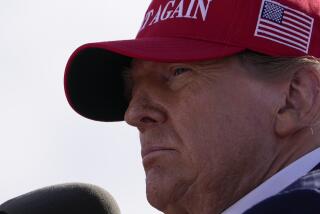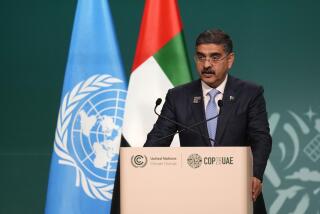Pakistan’s Taliban leader threatens attacks in the U.S.
- Share via
PESHAWAR, PAKISTAN, AND ISTANBUL, TURKEY — Baitullah Mahsud, the leader of Pakistan’s Taliban movement, threatened Tuesday to launch attacks in the United States in retaliation for missile strikes by American drones aimed at militant leaders sheltering in Pakistan’s tribal areas.
In an unusual step, the normally reclusive Mahsud personally made a round of telephone calls to news media representatives claiming responsibility for an audacious commando-style strike on a police training school near the eastern city of Lahore a day earlier. In those calls, he also threatened to widen his campaign of attacks.
“Our mission is to continue jihad in Afghanistan and Pakistan and to avenge drone attacks, even inside America,” he told a representative of The Times. Asked about a $5-million American bounty on his head, he replied, “Martyrdom is our aim, and we would be very happy if we could achieve it.”
U.S. and Pakistani intelligence officials have said Mahsud and his organization, thought to have links to Al Qaeda, are under increasing pressure as a result of the American missile strikes in Pakistan’s tribal areas, which have escalated sharply over the last six months. Several recent raids in Mahsud’s stronghold, in South Waziristan, have killed some of his close associates.
The Associated Press reported that a suspected U.S. drone missile attack killed at least 12 people today in the tribal region, according to intelligence officials. Two missiles targeted a suspected militant hide-out in the Orakzai area, near the Afghan border, the officials said.
Mahsud is blamed by the Pakistani government for dozens of suicide bombings and other attacks, including the December 2007 assassination of former Prime Minister Benazir Bhutto. He has denied responsibility for Bhutto’s killing.
Although Mahsud’s campaign of violence is aimed primarily at the Pakistani government, some fighters loyal to him have crossed into Afghanistan for attacks against Western troops battling an insurgency there.
In Washington, intelligence officials downplayed Mahsud’s threats, describing them as attention-grabbing assertions from a militant whose network does not extend beyond the region around Pakistan.
“He is a tribal leader that has probably some regional influence,” a senior U.S. counter-terrorism official said, discussing internal assessments on condition of anonymity. “Beyond that, I think it’s a lot of boasting on his part.”
Analysts at the CIA and other U.S. spy agencies believe that Mahsud comes into contact with Al Qaeda because members of the terrorist network travel through his tribal area. But Mahsud is not believed to be linked operationally to Al Qaeda.
Pentagon officials said that while they could not determine how serious or imminent Mahsud’s threats were, they were keeping a close watch on his group.
“He’s a bad guy,” a military officer said, discussing the internal assessments on condition of anonymity. “He, his activities and his group remain a threat. And this is an indication of how dangerous he and his group are.”
The FBI sent a bulletin Tuesday evening to its field offices and state and local law enforcement agencies with information about Mahsud, said an FBI official familiar with the confidential communication. The bulletin discounted his U.S. threats, describing them as “aspirational.”
“We are not aware of any imminent or specific threats to the U.S.,” FBI spokesman Richard Kolko said.
In his calls to Pakistani journalists primarily based in the tribal areas, Mahsud demanded an end to the missile strikes, which are generally carried out by aerial drones. He also denounced Pakistani President Asif Ali Zardari’s government, which he accused of complicity in the drone attacks.
The journalists he spoke to were familiar with his voice and manner of speaking, and said they were confident that he was the caller.
The Associated Press reported that in a telephone call Mahsud said, “Soon we will launch an attack in Washington that will amaze everyone in the world.” In a separate recorded conversation with the local Dewa Radio station, he said the White House was a target.
Mahsud, once an obscure sub-chieftain who is thought to be in his late 30s or early 40s, managed to consolidate his power over Pakistan’s Taliban movement in 2007, in part by ruthless elimination of tribal rivals. Followers refer to him reverentially as the “emir,” or leader. Within his zone of influence, his fighters have imposed a Taliban-style social code, enforcing his writ with beheadings and intimidation.
Extravagant threats are part of Mahsud’s repertoire. In 2007, he told Al Jazeera television that he wanted to demonstrate the “miracle of jihad” with attacks in New York, Washington and London. But despite a reputation for bluster, Mahsud is considered genuinely dangerous
Monday’s well-coordinated attack on the police training center near Lahore, the capital of Punjab province, was seen as the latest sign of Pakistan’s insurgency spreading outward from the tribal areas to the country’s heartland. Over the last 18 months, suicide bombings in major cities have become commonplace.
Pakistani officials said eight police recruits and teachers were killed in the Lahore-area attack, though several witnesses said they had seen more bodies than that, and that they believed authorities were reluctant to disclose the full extent of the killings.
At least four of the assailants died as well.
Ali is a special correspondent. Times staff writers Greg Miller, Julian E. Barnes and Josh Meyer in Washington contributed to this report.
More to Read
Sign up for Essential California
The most important California stories and recommendations in your inbox every morning.
You may occasionally receive promotional content from the Los Angeles Times.










